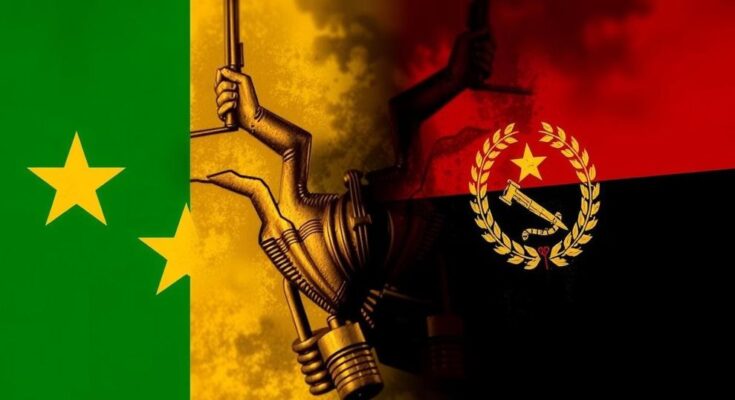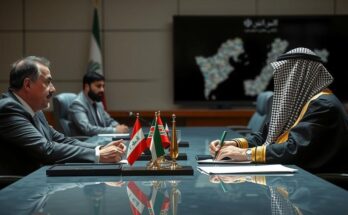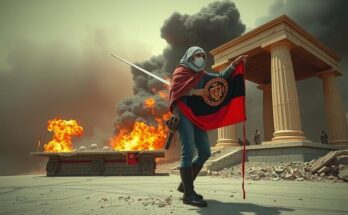Angola expresses concern over renewed violence in the DRC, condemning it as a breach of the ceasefire established on August 4. Angola’s mediation efforts involve facilitating dialogue between the DRC and Rwanda amidst ongoing conflict with rebel groups. Recent clashes near Kalembe have led to civilian injuries and increased displacement, reiterating the urgent need for peace and humanitarian support in the region.
Renewed violence in eastern Democratic Republic of Congo (DRC) has raised alarms within the Angolan government, as Luanda seeks to broker a longer-term ceasefire following a month of relative calm. In a press release issued on Tuesday, Angola denounced the fresh hostilities, characterizing them as a stark violation of both the ceasefire that commenced on August 4 and the recommendations established during a ministerial meeting on July 30. In December, Angola has tactfully mediated between the DRC and Rwanda amid accusations from both nations regarding support for rebel groups attempting to destabilize their respective governments. A recent mediator meeting held in Luanda two weeks prior had witnessed commitments towards peaceful resolutions, with Kinshasa assuring that the FDLR rebels, viewed as adversaries by Kigali, would not receive support from the Congolese army, contingent upon Rwanda ceasing its backing for the M23 forces. Angola firmly condemned the new outbreak of violence, which occurred around the village of Kalembe on Sunday and Monday, where clashes involved the Wazalendo self-defense forces, aligned with the Congolese army, against the M23 militia, who reportedly lost control of the area. Notably, Juvenal Munubo, a former MP from Walikale, stated, “I have learnt that the NDC Rénové (Kivu armed group), with logistical support from the Fardc, has regained control of the town of Kalembe. I call on the Fardc and the patriotic resistance fighters to consolidate this victory.” Meanwhile, MP Willy Mishiki cautioned that the rebels are eyeing further territorial expansion into provinces such as South Kivu, Tshopo, and Maniema. Despite a ceasefire showing initial success since August, Kinshasa remains resistant to negotiations with the M23. Nevertheless, ongoing discussions between the DRC and Rwanda continue to emphasize security cooperation, with their recent foreign ministers meeting on October 12 reinforcing the need for a collaborative approach to address outstanding issues related to a prospective peace agreement. Amid these turbulent conditions, Angola has stressed the necessitated avoidance of actions that could exacerbate the humanitarian crisis afflicting eastern DRC. Under the auspices of the African Union, Angola’s President João Lourenço remains committed to seeking a lasting resolution within the framework of the Luanda Process. A newly established verification mechanism to oversee peace efforts is slated to be officially launched in Goma no later than November 5, 2024. The latest clashes have resulted in at least 14 civilian injuries and provoked further civilian displacements. The Office of the United Nations High Commissioner for Human Rights foresees that the number of displaced individuals may reach 940,000 in 2024 alone, cumulating to nearly seven million in the DRC due to the ongoing conflict. Consequently, the dire circumstances have subjected civilians in North Kivu to extreme overcrowding and serious violations of human rights, including instances of sexual violence.
The recent escalation of violence in the eastern Democratic Republic of Congo (DRC) poses a significant challenge to regional stability, particularly for Angola, which has sought to mediate the conflict. The DRC has been embroiled in a complex struggle involving various rebel factions, including the M23 and FDLR, which are both seen as threats by the respective governments of DRC and Rwanda. Amidst these tensions, Angola has emerged as a mediator, seeking to foster dialogue and establish a ceasefire framework to alleviate the humanitarian crisis affecting millions. The situation is compounded by the serious humanitarian implications, including mass displacement and human rights violations.
In conclusion, the renewed fighting in the eastern DRC presents considerable challenges to the peace efforts spearheaded by Angola, which has tirelessly worked towards a sustainable resolution to the conflict. The recent violation of the ceasefire highlights the fragility of the situation and underscores the urgency for all parties involved to adhere to agreements made in prior negotiations. Addressing both the military and humanitarian aspects of the crisis is essential to fostering a secure environment for civilians affected by the conflict.
Original Source: www.theeastafrican.co.ke




